Emergency HVAC Stratford-upon-Avon
Top 24/7 HVAC Repair in Stratford-upon-Avon
Receive up to 3 After Hours HVAC quotes for your project today! Compare profiles, reviews, accreditations, portfolio, etc... and choose the best service.

Assist Heat
4.33 reviews66 Norman Ave, Nuneaton, CV11 5NY, GBAssist Heat – Emergency Plumber – Nuneaton is a family run plumbing business, providing Nuneaton area with a friendly professional service for all your plumbing and boiler repair requirements. Our 24 hour emergency plumber colchester. With locally based engineers covering these areas, Assist Heat – Emergency Plumber – Nuneaton specialize in all types of Plumbing services including Emergency Plumbing call outs, Boiler Repair, Boiler installation, Boiler servicing and full heating installations. Assist Heat – Emergency Plumber – Nuneaton pride ourselves as being one of the area’s premier 24 hour emergency Plumbing companies. When a problem occurs that requires an immediate response we offer complete solutions including Boiler repairs and waterleak repairs throughout Nuneaton 24 hours a day, 365 days a year. Highly skilled local Plumbers are on standby with fully equipped vans containing all the necessary equipment to carry out any Plumbing service. With our local Nuneaton engineers you know you’re in safe hands. We have had many recommendations through word of mouth. This is due to our policy of putting customer satisfaction as well as safety, above all else. Please contact one of are friendly office staff now to book a appointment.
- Services
- Why Us?
- Accreditations
- Gallery
Get Quote
Chillaire Ltd
512 reviewsAttleborough Fields Industrial Estate, Unit 1, Veasey Close, Nuneaton, CV11 6RT, GBChillaire is a leading provider of air conditioning, heating, and ventilation solutions for all applications. Based in the heart of England, we have various offices in surrounding areas, from where we provide a national service through our locally and remotely located engineers. Our team of experts is dedicated to delivering high-quality solutions that meet the unique needs of our clients. With a wide range of services, including consultancy, design, sales, service and repair, installations, maintenance, and hire, we are the perfect partner for all your HVAC needs.
- Services
- Why Us?
- Testimonials
- Gallery
Get Quote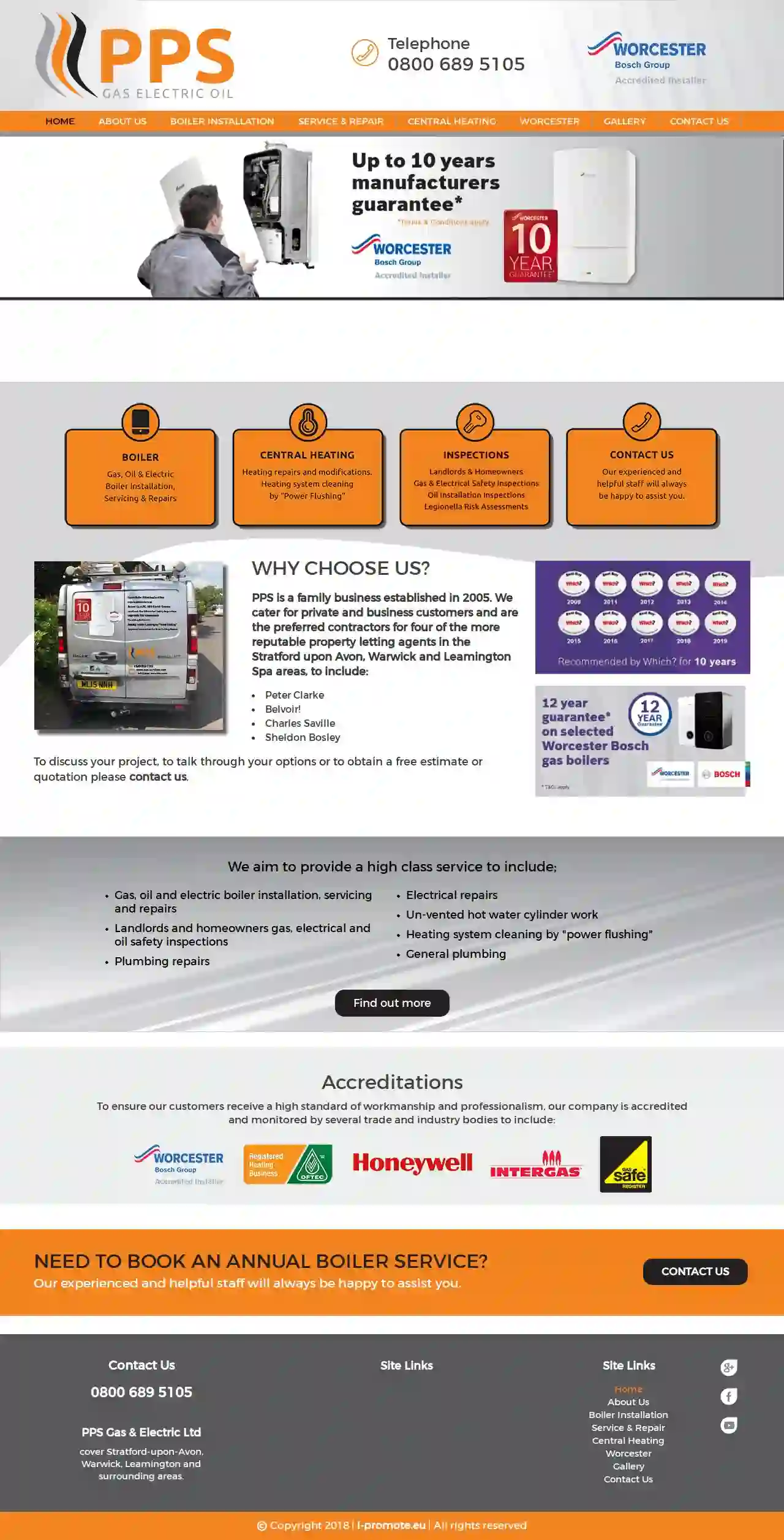
PPS Gas & Electric (Plumbing and Heating)
58 reviewsStratford-upon-Avon, Stratford-upon-Avon, Warwick, Leamington, and surrounding areas, GBPPS Gas & Electric Ltd is a family business established in 2005, catering for private and business customers. We are the preferred contractors for four of the more reputable property letting agents in the Stratford upon Avon, Warwick and Leamington Spa areas. We aim to provide a high-class service, including gas, oil and electric boiler installation, servicing and repairs, landlords and homeowners gas, electrical and oil safety inspections, plumbing repairs, electrical repairs, un-vented hot water cylinder work, heating system cleaning by 'power flushing', and general plumbing. We cover Stratford-upon-Avon, Warwick, Leamington, and surrounding areas.
- Services
- Why Us?
- Accreditations
- Gallery
Get Quote
Indoor Climate Systems (UK) Ltd
1New Road, Office 8, Malvern House, Solihull, B91 3DL, GBIndoor Climate Systems (ICS) is a leading UK mechanical services provider, specializing in creating controlled environments for commercial and industrial sectors. Established in 1992, ICS is privately owned and run by engineers, emphasizing project delivery and quality engineering expertise. The company boasts preferred contractor status with numerous clients and a high rate of repeat business, a testament to their performance. ICS takes pride in its team of highly qualified design engineers with over 100 years of combined onsite project management experience. ICS is certified in ISO9001 and ISO14001 and is a member of Constructionline. Their commitment to client satisfaction is evident in their 'TAKE TIME' initiative, a tailor-made plan ensuring snag-free, defect-free, on-time project completion. This involves meticulous design checks, proactive site snag management, dedicated commissioning managers, and comprehensive O&M manuals. ICS offers a comprehensive range of services, including design, build, specification, and drawings, utilizing the latest technologies like BIM, Revit, and AutoCAD 3D. They excel in project management, installation, and coordination with existing services and other trades, ensuring seamless integration. Detailed site surveys are conducted at the project's outset to guarantee accuracy in their drawings. ICS builds long-lasting relationships with clients and consultants based on high-quality service, a professional environment, and exceptional installations.
- Services
- Why Us?
- Accreditations
- Gallery
Get Quote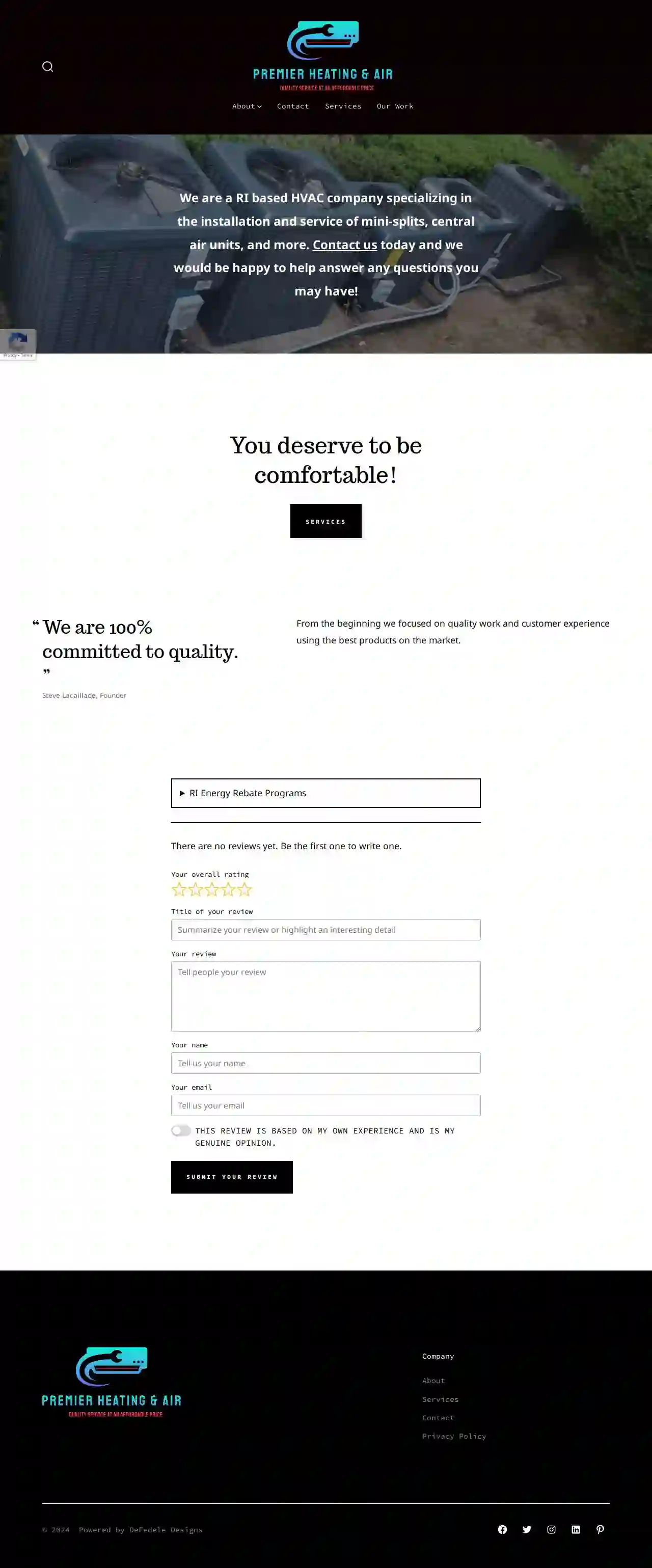
Premier Heating & Air
51 reviewsWarwick, GB- Services
- Why Us?
- Gallery
Get Quote
QVAC Ltd
1West Midlands, United Kingdom, Sutton Coldfield, B74, GBAt QVAC, our mission is simple: to create comfortable climates that elevate the standard of living and working environments across domestic, commercial, and industrial buildings. By adhering to our core principles of safety, functionality, and design, we strive to deliver HVAC solutions that are not just innovative but also integral to achieving optimal indoor comfort. With every project we undertake, we are committed to transforming spaces into comfortable, efficient, and visually appealing environments. Trust QVAC to bring unparalleled climate control to your space. Learn More. Budget-friendly and prompt HVAC services.
- Services
- Why Us?
- Gallery
Get Quote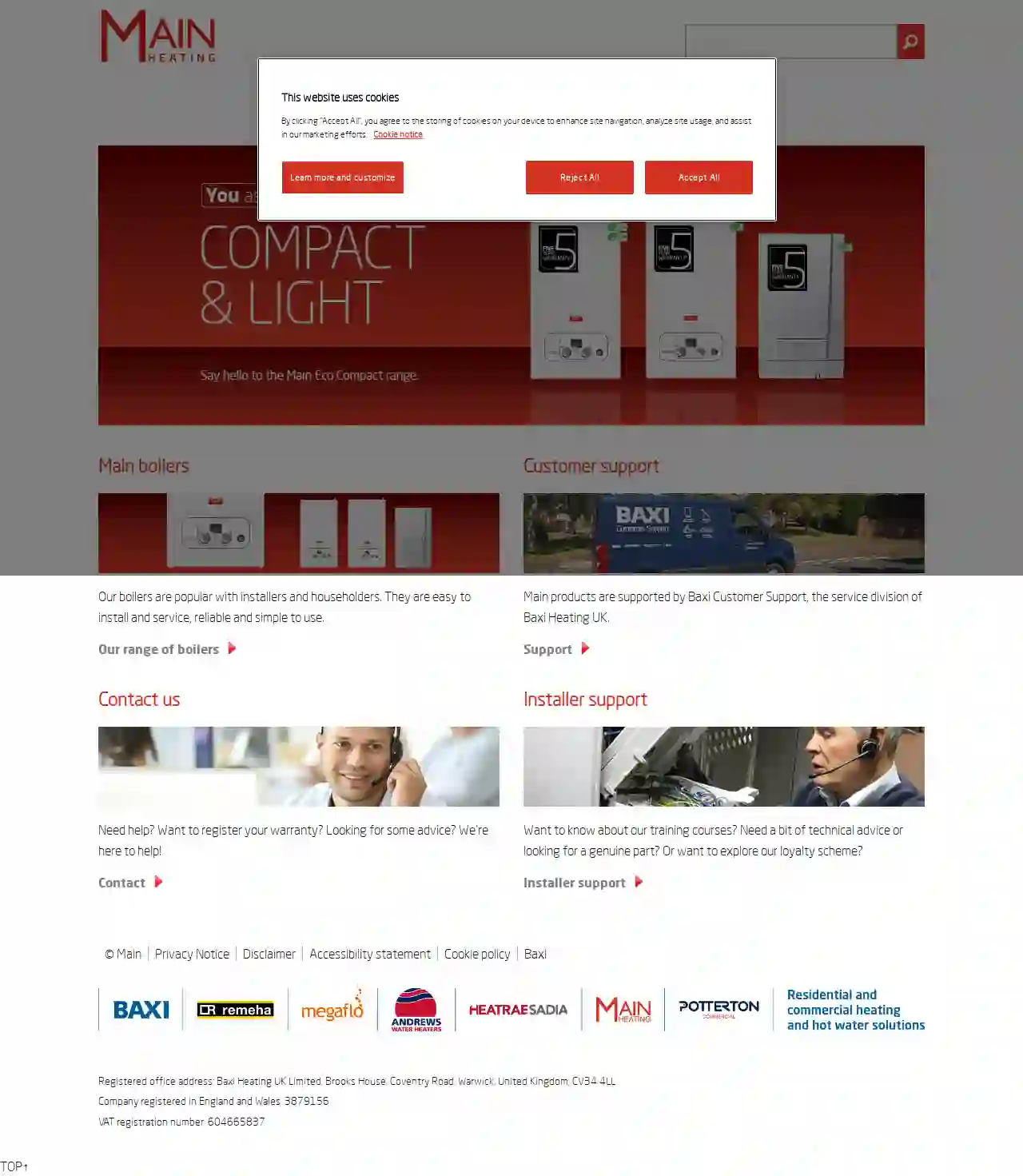
Main Heating
2.929 reviewsCoventry Road, Brooks House, Warwick, CV34 4LL, GBMain Heating is a leading manufacturer of gas boilers, hot water cylinders, and water heaters. They are part of the Baxi Group, a world-renowned company with a long history of innovation in the heating industry. Main Heating products are known for their reliability, ease of installation and use, and cost-effectiveness. They are supported by Baxi Customer Support, which offers expert advice, technical assistance, and a comprehensive warranty program. Main Heating is committed to providing customers with the best possible heating solutions, and they are actively involved in developing products that will help meet the UK's zero carbon goals.
- Services
- Why Us?
- Accreditations
- Gallery
Get Quote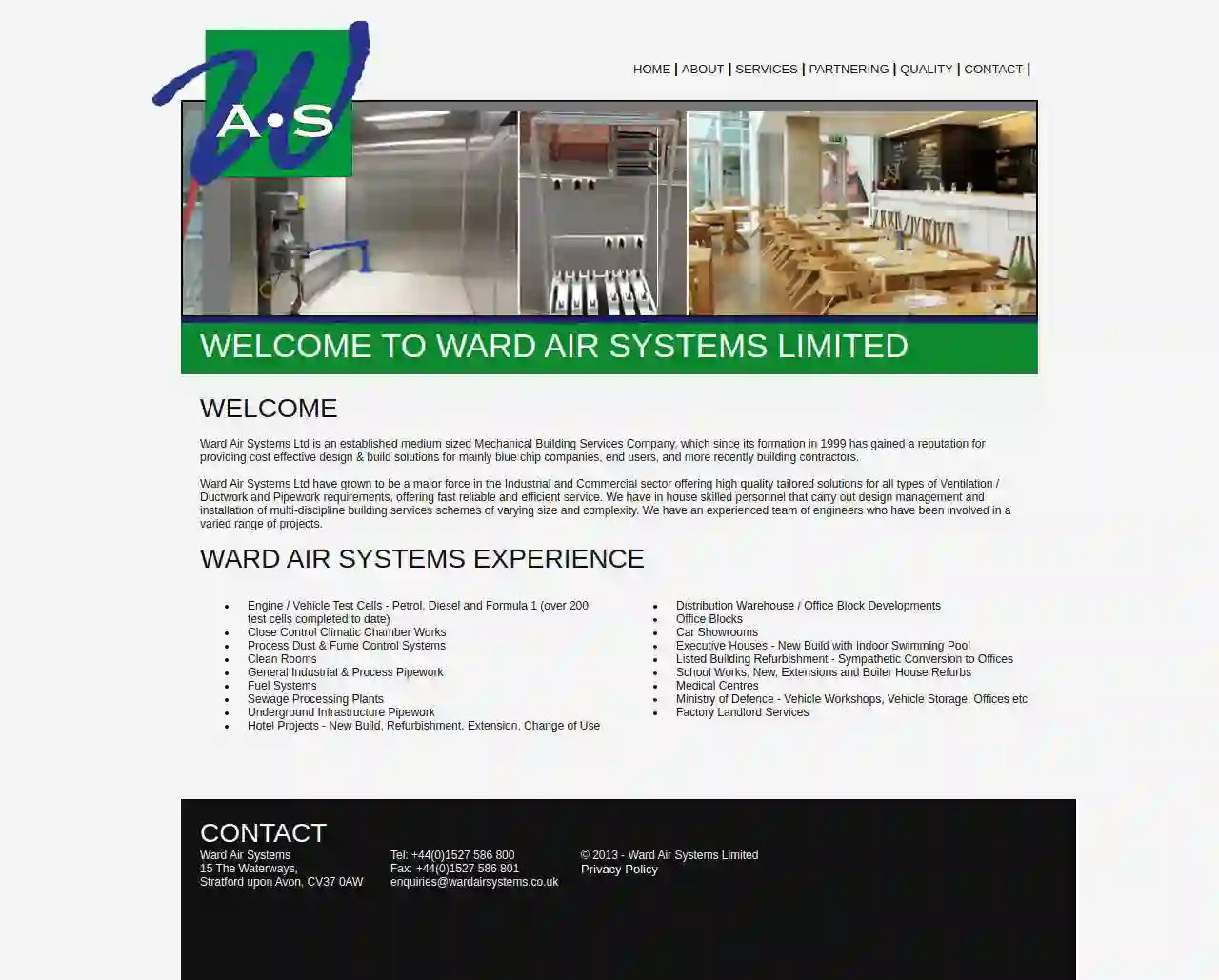
Ward Air Systems
51 reviews15 The Waterways, Stratford upon Avon, Stratford-upon-Avon, CV37 0AW, GBWard Air Systems Ltd is an established medium sized Mechanical Building Services Company, which since its formation in 1999 has gained a reputation for providing cost effective design & build solutions for mainly blue chip companies, end users, and more recently building contractors. Ward Air Systems Ltd have grown to be a major force in the Industrial and Commercial sector offering high quality tailored solutions for all types of Ventilation / Ductwork and Pipework requirements, offering fast reliable and efficient service. We have in house skilled personnel that carry out design management and installation of multi-discipline building services schemes of varying size and complexity. We have an experienced team of engineers who have been involved in a varied range of projects.
- Services
- Why Us?
- Accreditations
- Our Team
- Gallery
Get Quote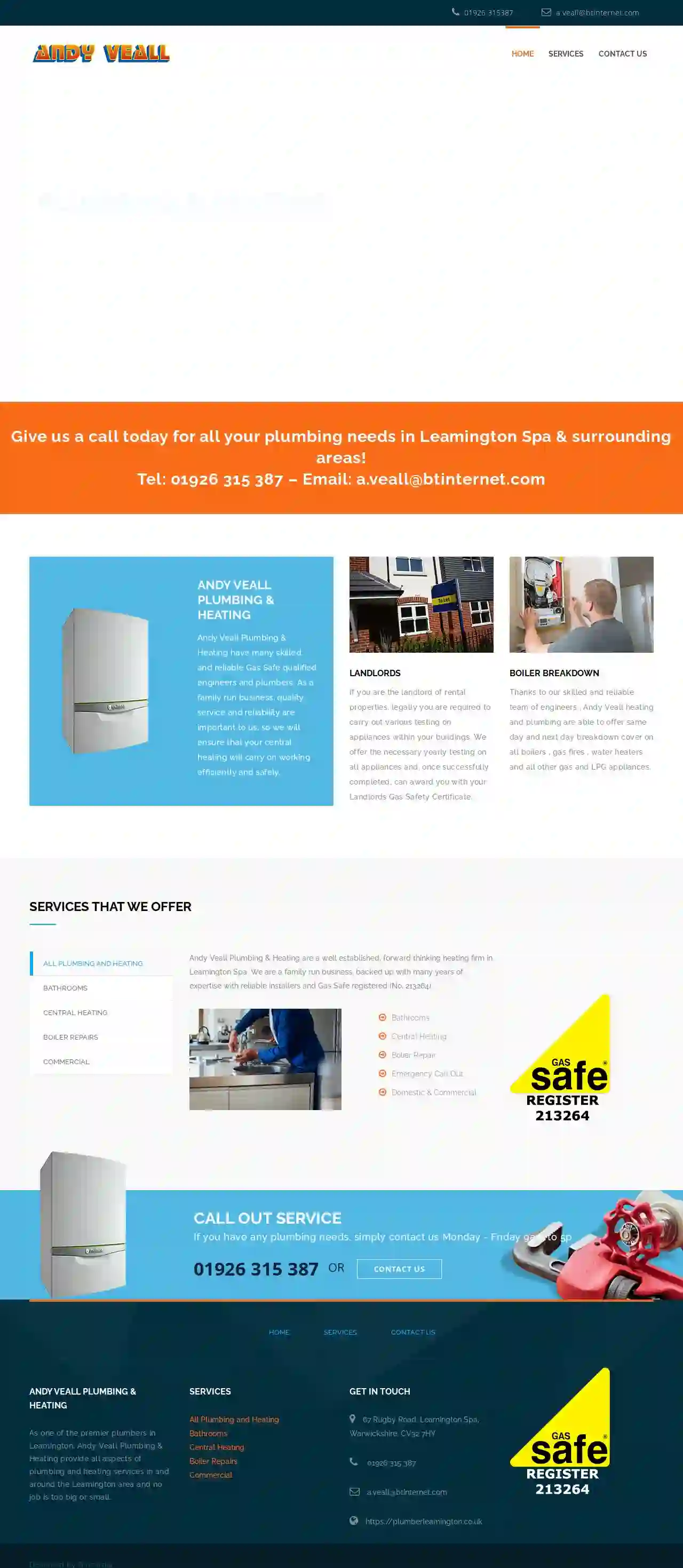
Andy Veall Heating & Plumbing
3.563 reviewsLeamington Spa, Warwickshire, 67 Rugby Road, CV32 7HY, GBAs one of the premier plumbers in Leamington, Andy Veall Plumbing & Heating provide all aspects of plumbing and heating services in and around the Leamington area and no job is too big or small. We are a family run business, backed up with many years of expertise with reliable installers and Gas Safe registered (No. 213264). We promise to give you the best possible customer service, and will work with you on an individual basis to get you the bathroom you need. Bathrooms are a specialist area of our business and our skilled team undertake many bathroom commissions.
- Services
- Why Us?
- Our Team
- Gallery
Get Quote
Oakwood Underfloor Heating
1The Old Dairy, Napton on the Hill, Oakwood Underfloor Heating, CV4 7AA, GBOakwood have been a leading Warwickshire Heating Installer for over 20 years and have a team of fully-certified professionals ready to tackle anything from complex and large scale construction projects to minor repair jobs. We know that dealing with all those mundane remodelling tasks can get pretty stressful, but We are here to take the load off your shoulders. We are fuelled by commitment to excellence and go the extra mile to make sure clients are fully satisfied with our work. Get in touch with us today for a free consultation. Whether you’re looking for help with something minor or need an experienced professional to take on a larger scale project,We can handle it all. We offer top-notch work at fair and competitive prices. Contact us today for a quote. PROFESSIONAL SERVICES We are Oakwood We Focus on Every Little Detail Our Services Taking you from idea to finished project! Underfloor Heating Send Thermal Survey Send Screeding Send Make the most of your space and put the heating underfloor Underfloor heating (UFH) is an efficient and cost-effective way to heat your home, offering significant savings and reducing clutter. By warming large surface areas at low temperatures, UFH creates a comfortably warm environment without the high energy costs. At Oakwood, we provide a variety of UFH systems and are dedicated to offering professional, friendly advice to help you find the perfect solution for your unique needs. Do you have existing underfloor heating? If yes, then let us make sure it is working efficiently and being controlled effectively so you are getting the most for your money. We make sure there are no weak points to your system to save you money in the long run. Screeding is an area of which we like to think of ourselves as specialists and thanks to our experience, we can offer this service at a very competitive rate without compromising on quality. There are various options available for screeding to suit different jobs and budget requirements. Feel free to get in touch if you'd like to learn more! Examples of our work Projects from Warwickshire - London Contact Us Despite some unforeseen difficulties, this particular project was completed on time and within budget. It’s the perfect example of our dedication to deliver a quality product, no matter what complications arise, in order to ensure full client satisfaction. The Old Dairy, Napton on the Hill Our client for this particular project was interested something economically and environmentally sustainable. We stayed within those boundaries throughout the whole process in order to ensure they were satisfied with the outcome. Binders Lodge, Kettering This client wanted UFH heating installed all the way through his terraced house in London to save wall space by eradicating the need for radiators. He had a tight time frame which we kept to without compromising on quality. Chiswick, London Follow Us Get in Touch Today! Let’s Get Started on Your Project NOW! Oakwood Underfloor Heating Menu Services Projects Contact Us Follow Instagram LinkedIn Facebook Contact07730 565861 Napton on the Hill, Warwickshire, England Privacy Policy © 2024 by Oakwood Underfloor Heating. Created by Gadd Marketing ServicesProjectsContact Us bottom of page
- Services
- Why Us?
- Gallery
Get Quote
Over 16,895+ HVAC Businesses registered
Our HVAC contractors operate in Stratford-upon-Avon & surrounding areas!
HVACCompaniesHub has curated and vetted Top HVAC Businesses in Stratford-upon-Avon. Find a top & reliable business today.
Frequently Asked Questions About Emergency HVAC Services
- Change or clean air filters every 1-3 months.
- Clear debris from around the outdoor unit.
- Check and clean the evaporator coil (if accessible).
- Inspect refrigerant lines for leaks.
How long does it take for an emergency HVAC technician to arrive?
What is a dehumidifier, and do I need one?
What is carbon monoxide, and how can it affect my HVAC system?
How do I maintain my air conditioner?
How long does it take for an emergency HVAC technician to arrive?
What is a dehumidifier, and do I need one?
What is carbon monoxide, and how can it affect my HVAC system?
How do I maintain my air conditioner?
- Change or clean air filters every 1-3 months.
- Clear debris from around the outdoor unit.
- Check and clean the evaporator coil (if accessible).
- Inspect refrigerant lines for leaks.